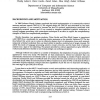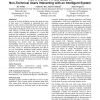15 search results - page 3 / 3 » Reasoning about Time and Knowledge in Neural Symbolic Learni... |
ICCBR
2001
Springer
13 years 9 months ago
2001
Springer
It is useful for an intelligent software agent to be able to adapt to new demands from an environment. Such adaptation can be viewed as a redesign problem; an agent has some origin...
SEMWEB
2005
Springer
13 years 10 months ago
2005
Springer
Abstract. We present a method for rapid development of benchmarks for Semantic Web knowledge base systems. At the core, we have a synthetic data generation approach for OWL that is...
FLAIRS
2008
13 years 7 months ago
2008
One of the central problems in building broad-coverage story understanding systems is generating expectations about event sequences, i.e. predicting what happens next given some a...
MUC
1991
13 years 8 months ago
1991
ind this work was to extract a relatively abstract level of information from each sentence , using only a limited vocabulary that was hand-crafted to handle a restricted set of tar...
CHI
2007
ACM
14 years 5 months ago
2007
ACM
In order to develop intelligent systems that attain the trust of their users, it is important to understand how users perceive such systems and develop those perceptions over time...



